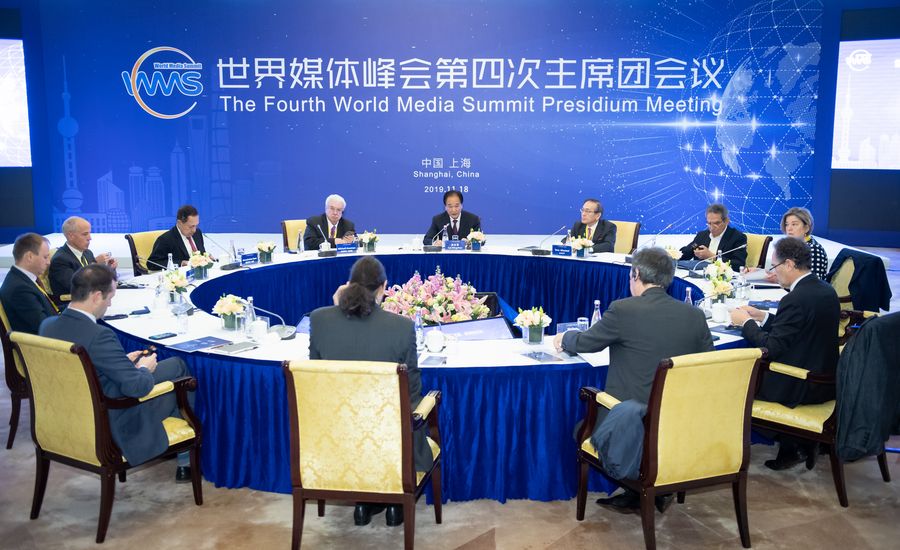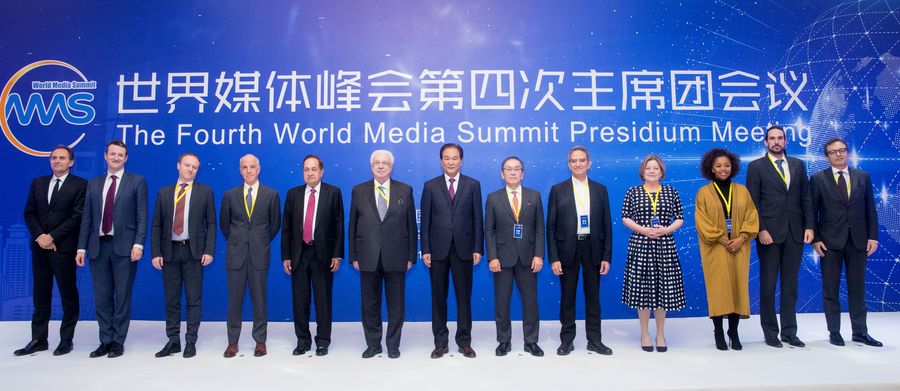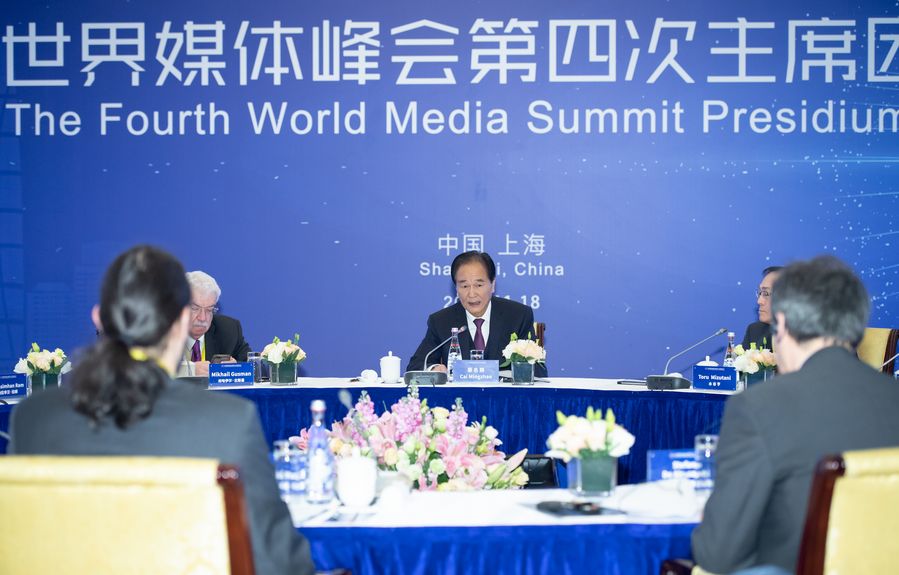
The Fourth World Media Summit Presidium Meeting is held in Shanghai, east China, Nov. 18, 2019. Senior executives of 13 media organizations from 11 countries attended the meeting themed on "New Era, New Media and New Vision". (Xinhua/Li Xiang)
The executives representing 13 media organizations from 11 countries championed new visions for global media development in all-media era at the fourth meeting of the World Media Summit presidium in Shanghai.
SHANGHAI, Nov. 20 (Xinhua) -- Senior executives from major international media organizations have championed new visions on the development of the global media industry to cope with the profound changes brought by the rapid development of new technologies.
The executives, who attended the fourth meeting of the World Media Summit (WMS) presidium held in Shanghai on Monday, called for innovations and cooperation between media organizations to improve their news services and shoulder greater social responsibilities such as combating fake news.
The delegates reached a consensus that media organizations should ride the wave of change, embrace innovation, seize development opportunities, overcome challenges, mitigate risks and strive to open up new development space.
The executives represent 13 media organizations from 11 countries, namely, the Agence France-Presse (AFP), Al Jazeera Media Network, the Associated Press, BBC, Kyodo News, Naspers South Africa, Reuters, Folha de S. Paulo Press Group of Brazil, International News Agency and Radio Sputnik, TASS Russian News Agency, the Hindu Group, Xinhua News Agency and ANSA.

The Fourth World Media Summit Presidium Meeting is held in Shanghai, east China, Nov. 18, 2019. Senior executives of 13 media organizations from 11 countries attended the meeting themed on "New Era, New Media and New Vision". (Xinhua/Ding Ting)
INNOVATIONS
Cai Mingzhao, executive president of the WMS and president of Xinhua, said changes in the media landscape are mainly reflected in four aspects: cross-border communications have transformed the media landscape; mobile end users business has become mainstream in the field of communication; technological evolution has recast modes of business for news industry; fake news posts challenges to journalism ethics.
Regarding the development and innovation of media in the future, Cai proposed that mainstream media should keep their advantages in content, innovate news products, strengthen technological leadership, and build an all-media team.
He said Chinese media have proposed to advance the integration of traditional and new media, conduct a systematic transformation of all links of news dissemination, and work hard to realize the media's integrated development.
"Amid the tides of media transformation, we cannot reverse the flow of this great river. We can only go with the flow, be proactive about innovations and take the initiative with our development," he said.
The delegates agreed that news media should follow the trend of widespread and profound changes taking place in the global media landscape, attach more importance to technological innovations, fully play their professional advantages, step up pragmatic cooperation and jointly discuss strategies for innovation and development.
Toru Mizutani, president of Kyodo News, said Kyodo has started to actively introduce artificial intelligence (AI) and the latest information technologies to editorial operations and digital services, such as automatically summarizing and categorizing content for distribution on a media-by-media basis.

Cai Mingzhao, executive president of the World Media Summit (WMS) and president of Xinhua News Agency, presides over and delivers a keynote speech at the fourth meeting of the WMS presidium in Shanghai, east China, Nov. 18, 2019. (Xinhua/Li Xiang)
FAKE NEWS
The executives also proposed that greater efforts should be made to crack down on fake news online, as well as to establish effective mechanisms and apply new technologies to safeguard the authenticity and credibility of news reporting.
Noting that the popularity of the internet has blurred the lines between fact and fiction, Cai said fake news posts challenges to journalism ethics, not only harming the audience but also undercutting the authority and credibility of mainstream media.
Media organizations have their own practices of verifying facts and combating rumors, but there is still no effective mechanism to strengthen cooperation and jointly crack down on fake news, said Cai.
Jim Kennedy, senior vice president of the Associated Press, said the company has established a special team to combat fake news and vet potentially false news on a daily basis.
Kennedy added that media organizations can collectively work on AI tools needed to discern deep fakes and that the WMS can provide a platform for media outlets to discuss technologies that can be used in this regard.
WMS IN NEW DECADE
Summarizing the achievements of the WMS in the past decade, Cai made several proposals at the presidium meeting to continuously inject vigor into the mechanism and enable it to play a bigger role.
He said the WMS needs to build a more open and inclusive platform for media cooperation, improve the operating mechanism of the summit to make it more practical and efficient and foster more popular and influential media cooperation projects.
The delegates agreed that the WMS mechanism has played a significant role in facilitating the communication and cooperation of media organizations around the world, becoming one of the most important high-end communication platforms for media globally.
They also proposed that in the face of changes and challenges, media across the world should strengthen cooperation, learn from each other and carry out pragmatic cooperation in various fields.
The WMS was co-initiated by nine media organizations with global influences, including Xinhua, News Corporation, the Associated Press, Reuters, TASS Russian News Agency, Kyodo News and BBC.
Organized by Xinhua, the first WMS was held in Beijing from Oct. 8 to 10, 2009. More than 170 media leaders from across the world attended the event, which issued a joint statement.
The second WMS was held in Moscow in 2012. The third summit was held in the Qatari capital of Doha in 2016, which issued the World Media Summit Doha Statement. ■



